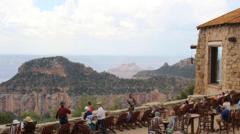In the aftermath of violence, the local economy grapples with fear while tourists slowly return.
**Tourism in Pahalgam: A Blend of Hope and Uncertainty After Recent Attack**

**Tourism in Pahalgam: A Blend of Hope and Uncertainty After Recent Attack**
After a catastrophic attack, Pahalgam's tourism faces both resurgence and trepidation.
Despite a recent deadly attack that claimed 26 lives, Pahalgam, a popular tourist destination in Indian-administered Kashmir, is witnessing a tentative resurgence in tourism. One week after the horrific incident, local streets showcase a mixture of hope and anxiety as shops begin to reopen and a small number of tourists trickle back into the area.
The violent assault last Tuesday, where militants targeted tourists at Baisaran, a scenic meadow close to Pahalgam, has sent shockwaves through the region. As tensions rise between India and Pakistan over the future of Kashmir, security remains a paramount concern, prompting the local government to close many popular tourist sites. The brazen act of violence against visitors, while historically rare, has left local businesses devastated and families in mourning.
Nonetheless, some tourists are opting to continue with their plans. Akshay Solanki, a visitor from Mumbai, noted the “panic” amongst his group on the day of the attack but indicated they chose to remain because returning home was not financially viable. Local residents and security agencies are striving to reassure them that safety is being prioritized. Tour guides and tourism advocates, including Bollywood actor Atul Kulkarni, are actively promoting the region, imploring travelers not to cancel their bookings but instead support the local economy by visiting.
The local economy, heavily reliant on tourism, now faces an uphill battle to recover. Merchants like shawl-seller Rafi Ahmed have reported drastically reduced sales, indicating a potential long-term economic void if tourist numbers do not bounce back quickly. Operators have reported cancellation rates for advanced bookings soaring to 80-90%, adding to the overall sense of uncertainty that looms over Pahalgam.
Simultaneously, authorities are stepping up security measures in response to the violence, with combing operations and detentions of suspected militants. However, this increased militarization may also deter potential visitors and scouts for new investments.
The tragedy of last week has cast a long shadow over Pahalgam. In a heartfelt speech, Jammu and Kashmir's chief minister, Omar Abdullah, acknowledged the profound grief voiced by families who lost loved ones. He emphasized the need for unity and resilience, urging potential tourists to remember the spirit of the Kashmiri people who supported each other in the wake of this unspeakable horror.
As the region grapples with the consequences of this attack, the rebuilding of trust and confidence among tourists and investors will be crucial for restoring Pahalgam's status as a go-to travel destination.
The violent assault last Tuesday, where militants targeted tourists at Baisaran, a scenic meadow close to Pahalgam, has sent shockwaves through the region. As tensions rise between India and Pakistan over the future of Kashmir, security remains a paramount concern, prompting the local government to close many popular tourist sites. The brazen act of violence against visitors, while historically rare, has left local businesses devastated and families in mourning.
Nonetheless, some tourists are opting to continue with their plans. Akshay Solanki, a visitor from Mumbai, noted the “panic” amongst his group on the day of the attack but indicated they chose to remain because returning home was not financially viable. Local residents and security agencies are striving to reassure them that safety is being prioritized. Tour guides and tourism advocates, including Bollywood actor Atul Kulkarni, are actively promoting the region, imploring travelers not to cancel their bookings but instead support the local economy by visiting.
The local economy, heavily reliant on tourism, now faces an uphill battle to recover. Merchants like shawl-seller Rafi Ahmed have reported drastically reduced sales, indicating a potential long-term economic void if tourist numbers do not bounce back quickly. Operators have reported cancellation rates for advanced bookings soaring to 80-90%, adding to the overall sense of uncertainty that looms over Pahalgam.
Simultaneously, authorities are stepping up security measures in response to the violence, with combing operations and detentions of suspected militants. However, this increased militarization may also deter potential visitors and scouts for new investments.
The tragedy of last week has cast a long shadow over Pahalgam. In a heartfelt speech, Jammu and Kashmir's chief minister, Omar Abdullah, acknowledged the profound grief voiced by families who lost loved ones. He emphasized the need for unity and resilience, urging potential tourists to remember the spirit of the Kashmiri people who supported each other in the wake of this unspeakable horror.
As the region grapples with the consequences of this attack, the rebuilding of trust and confidence among tourists and investors will be crucial for restoring Pahalgam's status as a go-to travel destination.



















